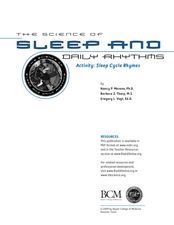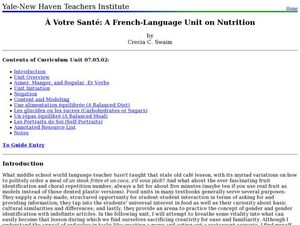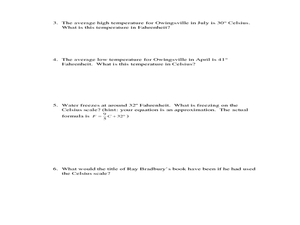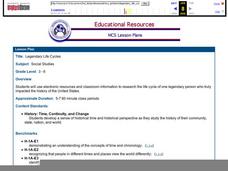Curated OER
Astronomy and the Cold War: How the United States Used the Moon to Target the Soviet Union
Students examine how astronomical observations were used to help target sites in the Soviet Union during Cold War and why such targeting was needed. Students then make predictions and observations of same astronomical events for their...
Curated OER
Saltwater Science
Students conduct an experiment that shows them how salt water allows things to float. In this salt water lesson plan, students mix ingredients together to create salt water and observe how it makes the oceans dense. They then interpret...
Curated OER
Heat: Mini Unit
Students experiment with heat. In this physical science lesson, students engage in hands-on activities to develop concepts related to heat. Students offer explanations for their observations using given vocabulary.
Curated OER
The Science of Sleep and Daily Rhythms
Students observe their own daily rhythms by going to bed earlier and seeing what happens to their day afterwards. In this sleep lesson plan, students experiment with their own sleep cycles and answer questions about what happened because...
Curated OER
Explore the Effects of Immigration
Students explore the effects of immigration on the immigrants and on society as a whole. They will record the experiences of specific immigrant groups using an E-sheet. Groups present a summary of what they learned about their ethnic...
Curated OER
Space Shuttle Science
Students study the nomenclature, operation and purpose of America's Space Transportation system. They demonstrate how water can be broken down into its component gases of hydrogen and oxygen by electrolysis. They construct and use the...
Curated OER
À Votre Sant?: A French-Language Unit on Nutrition
Students discover the basic nutritional information for different foods. In this nutrition lesson students classify items, identify what a balanced diet is and determine what recipes are healthy.
Curated OER
Celsius to Fahrenheit
Students convert degrees between two different units. In this algebra lesson, students graph linear equations and identify the line of best fit. They use their line of best fit to make predictions given a set of data.
Curated OER
Biomedical Engineering and Quality of Life Improvements
Young scholars complete an observational or natural science experiment. They do systematic and experimental work using experiments that have been done by others. They research their hypothesis and gather information from several...
Curated OER
Water Unit
Students make boats and race them. In this physics instructional activity, students investigate surface tension, molecules, and cohesion by competing in a class race with their boats. Students experiment with liquid soap to see how much...
Virginia Department of Education
The Ratio of Surface Area to Volume
Demonstrate the ratio of surface area to volume in your high school class by using phenolphthalein, gelatin, and an onion. Intrigue the class by leading a discussion on osmosis and diffusion, then making "scientific jello." Participants...
Virginia Department of Education
Molar Volume of a Gas
What is a chemist's favorite plant? Stoichiome Tree! Scholars produce hydrogen gas by reacting magnesium with hydrochloric acid. Then they calculate the molar volume of the gas produced before answering assessment questions.
Virginia Department of Education
Heat Transfer and Heat Capacity
It's time to increase the heat! Young chemists demonstrate heat transfer and heat capacity in an activity-packed lab, showing the transitions between solid, liquid, and gaseous phases of materials. Individuals plot data as the...
Virginia Department of Education
Partial Pressure
At some point, everyone has been under pressure—even Dalton! Explore Dalton's law of partial pressures with young chemists as they measure the volume of air extracted from a sample compared to its original volume. Class...
Virginia Department of Education
Weather Patterns and Seasonal Changes
Get your class outside to observe their surroundings with a lesson highlighting weather patterns and seasonal changes. First, learners take a weather walk to survey how the weather affects animals, people, plants, and trees during...
Curated OER
Legendary Life Cycles
Upper elementary historians research a legendary person who had an impact in the the history of the United States. Learners research the life of their person of choice, and construct a legendary timeline using computer software which...
Berkshire Museum
Adopt a Schoolyard Tree
Help young scientists connect with nature and learn about trees with a fun life science lesson. Heading out into the school yard, children choose a tree to adopt, taking measurements, writing descriptions, and drawing sketches of it in...
Code.org
Encoding B and W Images
Imagine drawing with zeros and ones. The third lesson in a unit of 15 introduces the class to creating black and white images. Pairs get together to create an encoding scheme in order to make these images. They move on to a...
American Chemical Society
Neutralizing Acids and Bases
Now that your science class has experimented with pH indicator and identified acids and bases, they attempt to get the cabbage juice indicator back to its original color. This is done through neutralization of the acids and bases that...
Beyond Benign
PPM
The 15th lesson in the series of 24 helps your classes understand the ppm (part per million) unit of measure. First, scholars experiment with food coloring to determine concentrations before applying their findings to calculate...
K20 LEARN
Transpiring Trees: Plant Transpiration and the Water Cycle
Looking for a tree-rific addition to your water cycle unit? Teams of young foresters examine the role of transpiration in the water cycle through a week's worth of activities. Pupils analyze how trees take in and transport water during...
Science Matters
May the Magnetic Force Be with You
Attraction and repulsive forces might seem mysterious to young learners. Have your classes experiment with these forces in the second installment of a 14-part unit on magnetism and electricity. Individuals test different...
Science Matters
Static Electricity
Working with static electricity is sure to give the class a charge! Budding scientists experiment with balloons and different materials to discover how to create static electricity. They learn about the transfer of electrons and the...
Science Matters
Motors
It's time to get moving! The 13th lesson in a 14-part unit on electricity and magnetism explores the relationship between electricity and mechanical energy. Budding scientists build motors and experiment with different components to...























